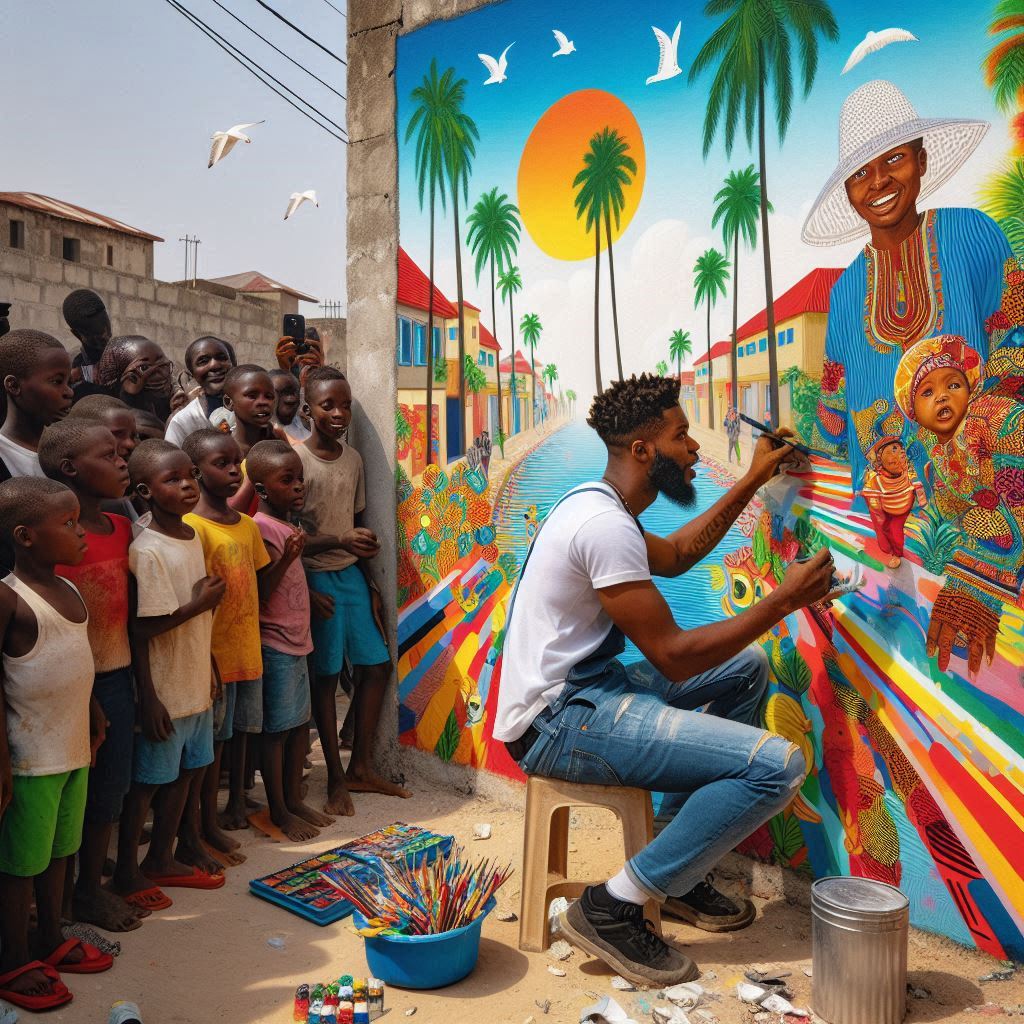Introduction
Nigerian literature in foreign languages refers to works by Nigerian authors written in non-native tongues. This includes English, French, and Portuguese.
Historically, colonial influence played a significant role in this linguistic shift. Nigerian writers adapted these languages, creating unique narratives. Over time, these works gained international recognition, showcasing Nigeria’s rich cultural heritage.
The development of Nigerian literature in foreign languages evolved through various phases. The early post-colonial period saw the rise of prominent writers like Chinua Achebe and Wole Soyinka.
Their works, written in English, depicted the Nigerian experience vividly. Today, a new generation of authors continues this tradition, blending contemporary issues with traditional themes.
Globally, Nigerian literature in foreign languages holds substantial importance. It provides a window into Nigeria’s diverse culture and history.
These works foster cross-cultural understanding and highlight universal human experiences. Consequently, they have made significant impacts on global literary landscapes.
Notable Nigerian Authors and Works in Foreign Languages
When it comes to Nigerian literature in foreign languages, several prominent authors have made significant contributions. These authors have not only written in languages other than their native tongues but have also gained international recognition for their works.
Prominent Nigerian Authors in Foreign Languages
- Chinua Achebe: Achebe, often referred to as the father of modern African literature, wrote his famous novel “Things Fall Apart” in English. This novel is considered a classic in African and world literature.
- Chimamanda Ngozi Adichie: Adichie, another celebrated Nigerian author, has written several novels in English, including “Half of a Yellow Sun” and “Americanah.” Her works have won numerous awards internationally.
- Wole Soyinka: Soyinka, a Nobel laureate in Literature, has written plays and essays in English. His play “Death and the King’s Horseman” is a notable work that explores themes of tradition and modernity.
- Ben Okri: Okri, a Booker Prize-winning author, has written novels and poetry in English. His novel “The Famished Road” is a magical realist work that delves into spiritual themes.
Key Works and International Acclaim
Several works by Nigerian authors writing in foreign languages have gained international acclaim for their rich themes, unique styles, and cultural influences.
- Half of a Yellow Sun by Chimamanda Ngozi Adichie: This novel, set during the Nigerian Civil War, explores the impact of conflict on individuals and families, shedding light on the complexities of human relationships.
- Things Fall Apart by Chinua Achebe: Achebe’s novel, which portrays pre-colonial Igbo society and the effects of British colonization, has been praised for its depiction of cultural clash and resilience.
- Death and the King’s Horseman by Wole Soyinka: This play, based on a historical event, delves into the clash between tradition and colonial rule, highlighting the complexities of cultural identity and duty.
- The Famished Road by Ben Okri: Okri’s novel, a blend of reality and myth, explores the spiritual journey of a spirit-child in a Nigerian village, offering a unique perspective on life, death, and rebirth.
Analysis of Themes, Styles, and Cultural Influences
These works by Nigerian authors in foreign languages showcase a diverse range of themes, styles, and cultural influences that reflect the complexities of Nigerian society and the broader African experience.
A common theme in many of these works is the exploration of identity, whether it be personal, cultural, or national. Authors often delve into the tensions between tradition and modernity, colonial legacies, and the quest for individual and communal belonging.
Stylistically, Nigerian authors writing in foreign languages have experimented with various narrative techniques, from magical realism to postcolonial storytelling, creating rich and vibrant literary landscapes that engage readers on multiple levels.
Culturally, these works draw from Nigerian history, folklore, and socio-political realities, offering nuanced portrayals of the country’s diverse ethnicities, languages, and traditions.
Through these narratives, authors challenge stereotypes, confront historical injustices, and celebrate the resilience of the Nigerian people.
Basically, Nigerian literature in foreign languages continues to captivate readers worldwide with its insightful portrayals of Nigerian society, its diverse cultures, and its complex histories.
The works of authors such as Achebe, Adichie, Soyinka, and Okri not only entertain and educate but also offer a window into the rich tapestry of Nigerian storytelling and literary tradition.
Read: Cultural Exchange Between Nigeria and China
Challenges and Opportunities in Translating Nigerian Literature
Translating Nigerian literature into foreign languages poses a myriad of challenges and opportunities for both the translator and the reader. Below are some key points to consider
Difficulties and Complexities
- Idiomatic Expressions: Nigerian literature is rich in idiomatic expressions that may not have direct equivalents in other languages, making it challenging to capture the full meaning.
- Cultural References: Nigerian literature often includes cultural references that are specific to the Nigerian context, requiring careful explanation or adaptation for foreign readers.
- Dialects and Vernacular: Many Nigerian authors write in local dialects or vernacular, adding layers of complexity to the translation process.
- Linguistic Nuances: Nigerian languages have unique linguistic nuances that can be difficult to convey accurately in a foreign language, leading to potential loss of meaning.
Role of Translators
- Precise Interpretation: Translators play a crucial role in preserving the original meaning and context of Nigerian literary works, ensuring fidelity to the author’s intentions.
- Creative Adaptation: Translators may need to creatively adapt certain phrases or expressions to convey the essence of the original work effectively in a different language.
- Cultural Mediators: Translators act as cultural mediators, bridging the gap between the Nigerian cultural context and the target audience, enhancing cross-cultural understanding.
- Research and Expertise: Translators need to have a deep understanding of Nigerian culture, language, and history to accurately translate the nuances of the text.
Cultural Nuances and Linguistic Challenges
- Taboos and Sensitivities: Translators must navigate cultural taboos and sensitivities to ensure that the translated work is culturally sensitive and respectful.
- Untranslatable Words: Some Nigerian words or concepts may be untranslatable, requiring creative solutions or footnotes to explain their meaning to foreign readers.
- Poetic Devices: Nigerian literature often relies on poetic devices such as proverbs, metaphors, and symbolism, which can be challenging to translate effectively.
- Historical Context: Translators need to consider the historical context of Nigerian literature and ensure that this context is accurately conveyed to foreign readers.
Therefore, translating Nigerian literature into foreign languages is a complex and nuanced process that requires careful attention to detail, cultural sensitivity, and linguistic expertise.
While there are significant challenges inherent in the translation process, there are also opportunities for translators to creatively adapt and preserve the beauty and richness of Nigerian literary works for a global audience.
Read: How to Open a Beauty Salon in Nigeria: Step-by-Step
Reception and Reception of Nigerian Literature in Foreign Languages
Assessment of how Nigerian Literature in Foreign Languages is Received and Perceived by International Audiences
Nigerian literature in foreign languages receives significant attention from international audiences.
These works, written primarily in English, French, and Portuguese, captivate readers worldwide. The universal themes and unique perspectives offered by Nigerian authors resonate deeply. This reception highlights the power of storytelling to transcend cultural boundaries.
International audiences perceive Nigerian literature as both exotic and relatable. Readers appreciate the authentic portrayals of Nigerian culture, history, and contemporary issues.
This literature offers a fresh lens through which to view universal human experiences. Nigerian authors like Chinua Achebe and Chimamanda Ngozi Adichie have gained global acclaim. Their works have paved the way for many emerging writers.
The Impact of Translated Works on the Promotion of Nigerian Culture and Identity Abroad
The translation of Nigerian literature into various languages further promotes Nigerian culture and identity abroad. Translated works make these stories accessible to non-English-speaking audiences.
This broadens the reach of Nigerian literature and enhances cultural exchange. Translations help preserve the authenticity and richness of Nigerian narratives. They also introduce global readers to the diverse voices within Nigerian literature.
The impact of translated works on the promotion of Nigerian culture is profound. These translations serve as cultural ambassadors, fostering a deeper understanding of Nigeria’s traditions and societal values.
They highlight the complexities of Nigerian life, challenging stereotypes and broadening perspectives. As a result, readers around the world gain a more nuanced view of Nigeria.
Analysis of the Influence of the Global Literary Market on the Circulation and Distribution of Nigerian Literature
The global literary market significantly influences the circulation and distribution of Nigerian literature. International publishers play a crucial role in bringing these works to a wider audience.
Major publishing houses recognize the growing interest in diverse voices and stories. They actively seek out Nigerian authors and promote their works globally. This increased visibility boosts the presence of Nigerian literature on the world stage.
The demand for Nigerian literature has led to a rise in international literary festivals and awards. Events like the Lagos Book and Art Festival and the Ake Arts and Book Festival attract global attention.
These platforms provide opportunities for Nigerian authors to showcase their work and engage with international audiences. Awards like the Booker Prize and the Commonwealth Writers’ Prize further amplify the voices of Nigerian writers.
However, challenges remain in the global literary market. Issues of representation, accessibility, and fair compensation for authors persist.
Despite these challenges, Nigerian literature continues to thrive and gain recognition. Authors, translators, and publishers work collaboratively to overcome barriers and ensure wider distribution.
Read: Cosmetology and Beauty Therapy Scholarships in Nigeria

The Role of Nigerian Literature in Foreign Languages in Education and Cultural Exchange
Nigerian literature in foreign languages plays a significant role in both education and cultural exchange.
By delving into this topic, we can understand the impact these works have on academic settings, cross-cultural communication, and appreciation of Nigerian culture beyond its borders.
Examining the use of Nigerian literature in foreign languages in academic settings and curriculum development
In educational institutions around the world, Nigerian literature in foreign languages is incorporated into curricula to provide students with a broader perspective on literary traditions.
These works offer a unique insight into Nigerian culture, history, and social issues, allowing students to engage with diverse perspectives and experiences.
Studying Nigerian literature in foreign languages improves students’ language skills and deepens their understanding of Nigerian society’s complexities.
These texts serve as a gateway to exploring themes such as post-colonialism, identity, and globalization, providing students with a rich tapestry of narratives to analyze and interpret.
Curriculum developers recognize the value of including Nigerian literature in foreign languages as a way to broaden students’ cultural horizons and foster a more inclusive educational experience.
By diversifying the literary canon, educators are able to challenge traditional narratives and introduce new voices and perspectives to students.
How these works facilitate cross-cultural communication and understanding
Nigerian literature in foreign languages serves as a bridge between different cultures, facilitating cross-cultural communication and understanding.
Exploring Nigerian stories in foreign languages allows readers to connect deeply with the nuances and complexities of Nigerian society.
These works allow for a deeper exploration of Nigerian history, traditions, and values, enabling readers to appreciate the cultural richness and diversity of the country.
By engaging with Nigerian literature in foreign languages, readers are able to challenge stereotypes and misconceptions, fostering a deeper sense of empathy and understanding across cultures.
Literary analysis and discussions encourage readers to critically engage with themes and motifs in Nigerian literature. This fosters greater appreciation for the complexities of Nigerian society.
These conversations break down barriers and build bridges between communities, fostering interconnectedness and mutual respect.
Initiatives and programs that promote the study and appreciation of Nigerian literature in foreign languages
There are numerous initiatives and programs that aim to promote the study and appreciation of Nigerian literature in foreign languages.
Organizations such as the Nigerian Literary Society and the Nigerian Writers’ Association work to showcase the diverse range of Nigerian literature available in foreign languages.
These organizations host literary festivals, workshops, and reading groups celebrating Nigerian literature in foreign languages. They provide platforms for writers, scholars, and readers to engage with these works.
By highlighting the richness and diversity of Nigerian literature, these initiatives help to raise awareness and appreciation for the country’s literary heritage.
Academic institutions and cultural centers worldwide offer courses focused on Nigerian literature in foreign languages. They provide students and the public opportunities to explore these works in depth.
By engaging with Nigerian literature in foreign languages, individuals are able to broaden their cultural horizons and develop a deeper appreciation for the complexities of Nigerian society.
Nigerian literature in foreign languages plays a vital role in education and cultural exchange. It offers readers a gateway to explore the nuances and complexities of Nigerian society.
Examining these works in academic settings fosters cross-cultural communication. Promoting initiatives celebrating Nigerian literature enhances appreciation of Nigeria’s rich literary traditions.
Read: Day in the Life of a Nigerian Beauty Therapist
Trends and Future Prospects of Nigerian Literature in Foreign Languages
Current Trends and Emerging Voices in Nigerian Literature in Foreign Languages
Nigerian literature in foreign languages is experiencing a surge in popularity and recognition.
Many young Nigerian writers are gaining international acclaim for their works in languages such as English, French, and Spanish.
Authors like Chimamanda Ngozi Adichie, Teju Cole, and Helen Oyeyemi are leading the charge in representing Nigerian stories on a global scale.
These writers are not only exploring traditional Nigerian themes but also integrating modern perspectives and diverse cultural influences.
Moreover, there is an increasing interest in translating Nigerian literature into various foreign languages to reach a wider audience.
This trend reflects the growing demand for diverse voices and narratives in the global literary scene.
Transform Your Career with Expert Guidance
Get personalized mentorship consulting that’s tailored to your unique path. Our expert advice is actionable and exclusive.
Get StartedFuture Direction and Potential Growth of Nigerian Literature in Foreign Languages
The future of Nigerian literature in foreign languages looks promising as more writers continue to emerge and capture international attention.
There is a potential for increased collaboration between Nigerian authors and foreign publishers to expand the reach of these works.
Additionally, the rise of digital platforms and online publishing presents new opportunities for Nigerian writers to connect with a global audience.
As the literary landscape becomes more interconnected, Nigerian literature in foreign languages is poised for sustained growth and recognition.
The evolving nature of language and storytelling provides a fertile ground for innovation and creativity in the years to come.
Opportunities for Collaboration and Partnerships in Promoting Nigerian Literature in Foreign Languages on a Global Platform
Collaboration and partnerships are essential in promoting Nigerian literature in foreign languages on a global scale.
International literary festivals, translation programs, and cultural exchanges offer avenues for showcasing Nigerian writers and their works.
Collaborating with foreign publishers, literary agents, and educational institutions can facilitate the translation and dissemination of Nigerian literature in different languages.
Engaging with literary communities and cultural organizations worldwide can create a network of support for Nigerian writers seeking an international audience.
By fostering partnerships and leveraging global platforms, Nigerian literature in foreign languages can continue to thrive and inspire readers across borders.
Conclusion
In closing, we explored the rich world of Nigerian literature in foreign languages. We discussed its historical roots and influential authors.
We also examined its development and global impact. Nigerian writers use foreign languages to share their unique cultural narratives.
These works play a crucial role in enriching global literature. They offer fresh perspectives and deepen cross-cultural understanding.
By reading these works, we appreciate the diversity of human experiences.
Supporting Nigerian authors writing in foreign languages is essential. Their voices contribute significantly to global literary diversity.
We encourage readers to explore these authors and their works. Buy their books, share their stories, and promote their literature.
Your support helps preserve and promote Nigerian cultural heritage. Let’s celebrate and support the brilliant minds enriching our literary world.
Discover the depth and beauty of Nigerian literature in foreign languages today. Your journey into this vibrant literary landscape starts now.




